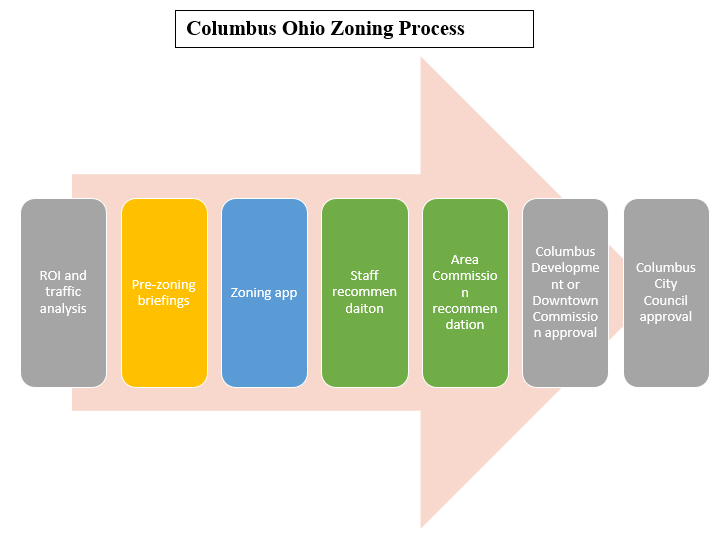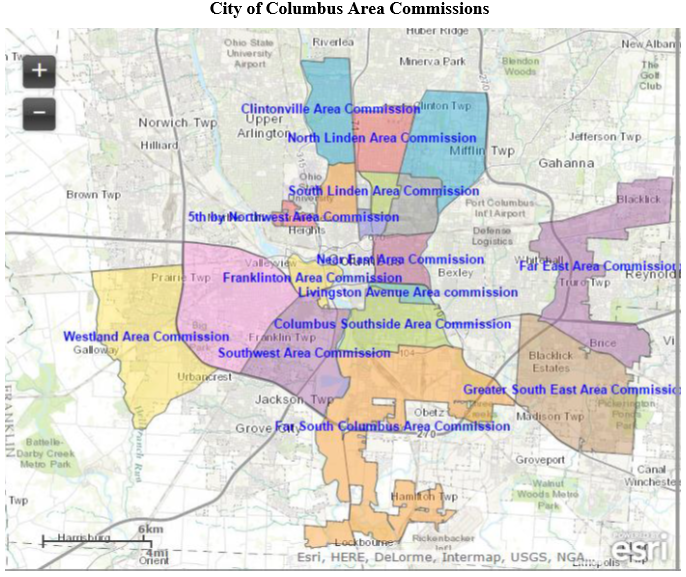The City of Columbus implements Ohio’s statutory framework for land use regulation through the adoption of a city-wide comprehensive plan, but also regional land use plans gathered with input from community groups. The Columbus zoning process permits amendments as well as variance and follows clearly defined steps as outlined below.

Communities like the City of Columbus, Ohio operates with an at-large city council that generally receives zoning amendment recommendations from the Columbus Development Commission and a local area commission. Columbus operates with 16 area commissions that include: 5th by Northwest; Clintonville; Far East; Far South; Franklinton; Greater Hilltop; Greater Southeast; Livingston Avenue; Milo-Grogan; Near East; North Central; North Linden; Southside; Southwest; South Linden; and Westland. Columbus Area commissions are established to afford additional voluntary citizen participation in decision-making in an advisory capacity and to facilitate communication, understanding, and cooperation between neighborhood groups, city officials, and developers. Disclosure of the bylaws, procedures, and rules assures accessibility of necessary information. General standards and filing procedures serve as guidelines for the establishment of area commissions, assure compliance with minimum requirements, effect area representation, and permit flexibility and individuality without the legislative burden of detailed codification and periodic amendments for each commission. Suggestions and comments of the area commission are advisory only and failure of the applicant to comply therewith shall not in itself constitute grounds for denial of the application. Failure of the applicant to consult the appropriate area commission in a timely manner, however, may be grounds for postponement of further action by other bodies. Columbus area commission also plays a role in local planning and community liaison role such as creating plans and policies which will serve as guidelines for future development of the area, bringing problems and needs of the area to the attention of appropriate government agencies, recommending solutions or legislation, holding regular public meetings, public hearings on problems, issues and proposals affecting the area, public forums and surveys for interested parties to state problems and concerns, soliciting active cooperation of all segments of the area, initiating and supporting local proposals, and promoting and encouraging local businesses.

Recommendations for Columbus zoning amendments following a recommendation from a Columbus area commission then goes to the Columbus Development Commission for a recommendation to Columbus City Council. The Columbus Development Commission has have all of the powers, authority and duties granted to it by ordinances of council, and by Section 713.02 of the Ohio Revised Code which outlines the duties of Ohio municipal planning commissioners to the extent that the same are not in conflict with the Columbus City codes, the charter, or with ordinances or resolutions heretofore enacted by council. The Columbus Development Commission is an advisory body to the Director of Development and Columbus City Council in matters related to the preparation, execution and administration of urban renewal development, rehabilitation, and conservation plans. The Columbus Board of Zoning Adjustment hears appeals for variance requests in the City of Columbus, Ohio.
The City of Columbus created an expedited land use entitlement process for Downtown Columbus to ease the efforts to develop the Central Business District through the creation of a special zoning process for Downtown Columbus. First, Columbus created the Downtown Columbus Commission to review all land use issues in Downtown Columbus. The Downtown Commission was formed in 1997 with the adoption of the Downtown District chapter (CC 3359) of the Columbus Zoning Code. Adoption of the code resulted in all of Downtown’s 4,000 plus parcels being combined into a single zoning district where most uses are permitted pending design review. A major update to the district and a set of companion Design Guidelines were adopted by City Council in July 2013. The Downtown Commission functions as the district’s development review body-serving as the Development Commission, Board of Zoning & Adjustment, and Graphics Commission for the downtown. The Commission evaluates applications based on their compliance with the provisions of CC 3359 and the Downtown Design Guidelines. The Commission also considers city-adopted plans and policies for the downtown and related applicable regulatory requirements. The City of Columbus Downtown District DD zoning covers all of Downtown; thus, no rezoning for transitioning existing offices into residential is required. Instead, companies seeking to transition an existing use need to seek a change of use permit provided by the Columbus Building and Zoning Services. The Downtown Commission will review any exterior modifications to the building or site plan, as well as graphics and lighting.
Zoning in Columbus, Ohio, like all communities is a democratic process driven by community involvement. Neighbors and area residents can positively or negatively impact the chances for residential development and efforts to gain zoning changes should not be taken lightly.
Please contact Dave Robinson at [email protected] if you have any questions about a zoning or other economic development matters.